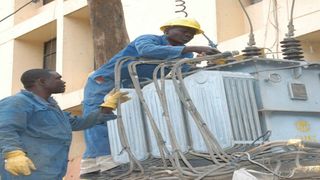
Kenya Power technicians repairing a transformer along Kenyatta Lane in Nakuru City in 2021.
| File | Nation Media GroupOur Columnists
Premium
Kenya Power monopoly should be broken up to allow competition
I never wish ill for my country. Yet in certain moments one despairs. Take the night of August 25. The lights went off across the entire nation, literally. The Sunday Nation headlined it as "Shame of a Nation." A 20-hour countrywide power blackout is something no normal country in the world can tolerate. Believe you me there would be consequences.
Heads would roll in the power supply chain from top to bottom like you've never seen before. No question about it. There would even be a commission of inquiry to unravel the systemic rot in the energy sector. A selective internal investigation wouldn't be enough. Typically, the Energy Cabinet Secretary and the CEO of Kenya Power and Lighting Company, the power utility, were treating the prolonged outage, in which businesses suffered unquantifiable losses, as a routine glitch. You just wonder, why is the CEO still in office? Seriously?
There were the usual excuses. The scapegoat the CS chose to shift blame to, Lake Turkana Wind Power, roundly contradicted him. On his part the Principal Secretary in the ministry was spinning a fantasy of upgrading to nuclear power in the near future. Jeez, does he know the cost of buying and installing a nuclear power plant? A 1,000MW plant can cost anywhere between $6-$9 billion. Bigger ones cost upwards of $20-$30 billion. And do we have the technological expertise to run a nuclear reactor? Do we have trained nuclear safety engineers? Or would we be setting ourselves up for nuclear meltdowns like happened at the Three Mile Island plant in the US (1979), or at Chernobyl in the former Soviet Union (1986), or the more recent accident at Fukushima in Japan (2011)? Guys, just stick to hydro-power and geothermal. We're far from exhausting their potential. You can't handle nuclear energy yet. Period.
Thankfully Parliament is now taking a hard look at the power sector. The National Assembly Energy Committee has proposed the law be amended to allow consumers a choice of bypassing Kenya Power and buying electricity directly from Independent Power Producers (IPPs). Basically, the MPs seek to know: why is the cost of electricity so abnormally high? Kenya Power blames IPPs for charging it scandalous tariffs. But why did it enter into those lopsided agreements in the first place? And given the repeated disruptions consumers experience, why is Kenya Power’s distribution function run so incompetently?
Everybody agrees Kenya Power's monopoly on electricity distribution should end. If the government, for reasons we know, is reluctant to privatise the utility, then let competitors move in. Kenya Power doesn't own the national transmission grid. This is the preserve of an entity called Kenya Electricity Transmission Company (Ketraco), another parastatal with a questionable record. Ideally, private investors should be allowed to buy power directly from KenGen, the national electricity generating company, lease Ketraco's lines, and then set up their own customer distribution infrastructure.
Kenya Power is decrepit, corrupt and wildly inefficient. Start with inflated bills. Go to the endless fiasco with electricity tokens. Then the perennial outages. On and on the pain for consumers intensifies. The company has frequently been accused of using sub-standard equipment, the outcome of corrupt tendering. With the erratic KPLC supply, Kenyans are migrating to solar, for homes and businesses. Devki Steel, for one, is installing a 4MW solar plant at its Ruiru factory.
Recently I listened to Ugenya MP David Ochieng being interviewed on television. He had good ideas about overhauling Kenya Power. Or sidestepping it altogether. Everything boiled down to breaking up its monopoly to give way to competitors. Competition doesn't have to mean another national distributor. Private regional or city entities should be encouraged. Nairobi can be served by several distributors. The same can be done with Mombasa, Nakuru, Kisumu and so on. If Kenya Power cannot compete, it should be left alone to die a natural death.
* * * * * * *
Everything, as they say, must come to an end. Today is the finale for this column. It got launched a couple of weeks before the 1998 August 7 bomb blast in Nairobi, without a name. I couldn't figure out anything suitable. Soon afterwards the editor, at a whim, gave it a name: ‘Sunday View.’
It's been one long ride of chronicling the drama of Kenya, and often beyond. A journey of 25 memorable years. From the twilight of the Daniel arap Moi era to the Mwai Kibaki and Uhuru Kenyatta years down to the dawn of William Ruto's rule. ‘Sunday View’ has taken in an eclectic mix: politics, culture, history, travel, terrorism, globalisation and once, in what drove the editor into a fit, even extra-terrestrials.
Who knows, I might put all those weekly columns together into a published volume. Hopefully in years to come my youthful son will come around to reading them. But for now, my dear reader, it's time to do other things. And to physically explore Kenya to its remotest corners. Adieu, all!
Twitter: @GitauWarigi ([email protected])





